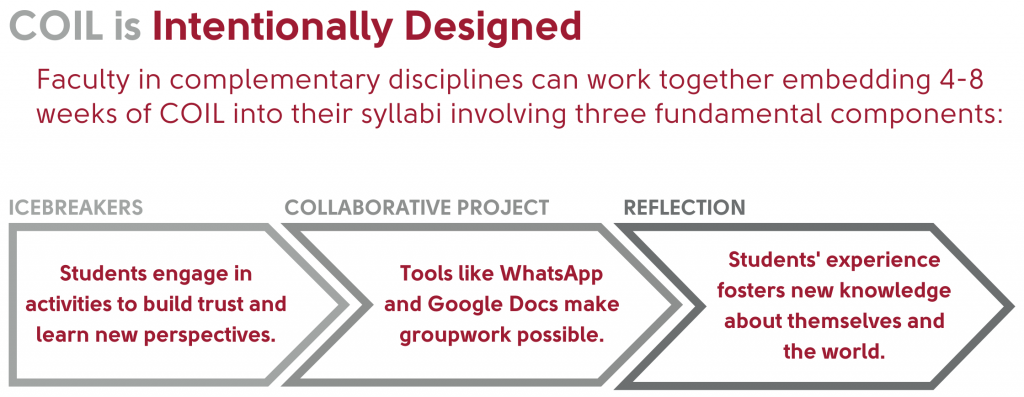What is COIL: Collaborative Online International Learning?
Definition: COIL (Collaborative Online International Learning) is a cost-effective way of offering international education, global learning, and intercultural experiences to UA students in all disciplines. COIL links students and faculty across borders for shared teaching and learning experiences using a wide variety of online communication methods.
Methodology & Purpose: The COIL methodology does not involve a set curriculum or delivery platform. Rather, it is a flexible framework for developing courses, connecting institutions, faculty and students, and supporting institutional goals for student learning and engagement. COIL can help UA colleges and departments achieve goals for delivering global learning and cross-cultural experiences to a larger number of students. It is an ideal vehicle for achieving Goal #1 in UA’s Strategic Plan: “Provide a premier undergraduate and graduate education that offers a global perspective and is characterized by outstanding teaching, high-quality scholarship and distinctive curricular and co-curricular programs.”
Origins: The State University of New York’s (SUNY) COIL Center was created in 2006 and develops and disseminates a wealth of information regarding COIL. COIL (also referred to as virtual exchange) has been adopted by a wide variety of institution types across the U.S. and around the world. In addition, the American Council on Education (ACE) has recognized the COIL methodology for over a decade. In 2018, UA received a small ACE grant to initiate COIL activities with a partner institution in Japan (see below).

ACE US-Japan COIL Initiative at UA
ACE Grant: In August of 2018, UA, along with five other institutions across the U.S., was selected to participate in the ACE U.S-Japan COIL Initiative. The Initiative was a pilot program supported through a grant from the U.S. Embassy in Tokyo and was coordinated in partnership with the Japanese Ministry of Education, Culture, Sports, Science, and Technology (MEXT).
Workshop: In October of 2018, ACE hosted a course development workshop in Washington, DC for the U.S. institutions and their Japanese partners. The SUNY COIL Center also partnered with ACE to provide professional development support to the institutional teams. The UA team consisted of Cory Callahan, College of Education; Leigh Dickson, College of Nursing; Kevin Halbrook, Center for Instructional Technology; and Carolina Robinson, Capstone International Center/Education Abroad.
Japanese Partner: Each U.S. institution partnered with an institution in Japan to expand U.S.-Japan higher education ties through COIL. Faculty collaborated on joint syllabi, and students in each country worked together to complete assignments with shared learning objectives for courses offered in 2019. UA worked with Chiba University. Chiba is a comprehensive research university located just outside of Tokyo and is a long-time partner of UA.
Dr. Callahan and Dr. Dickson communicated with their counterparts in Japan, Dr. Katsuki Umeda (Faculty of Education) and Dr. David Casenove (College of Nursing) throughout the spring and summer of 2019 and their respective COIL courses took place during the fall of 2019. The nursing students exchanged information on healthcare systems and family-centered care. The education students explored similarities in social studies education between the U.S. and Japan; refined their understanding of international education; and shared ideas for a wise-practice activity for secondary students in both countries.
In addition to the two initial collaborations that were part of the ACE Grant, a number of other COIL course connections evolved from the collaboration with Chiba and were supported with funding from MEXT. These are listed in the table below along with other COIL courses that were supported by other initiatives and funding sources.
Case Study: Dr. Yoshie Takamitsu (Chiba University) and Dr. Tayler Kent (University of Alabama) co author an article titled “Providing opportunities for participation in intercultural activities through Collaborative Online International Learning : a case study of COIL between Chiba University and the University of Alabama” in the Journal of Liberal Arts and Sciences, Chiba University.
| UA Professor | Course & Semester | Partner Institution | Partner Instructor | Additional Information |
|---|---|---|---|---|
| Cory Callahan | Fall 2019, Fall 2020, Fall 2021, Fall 2022 | Chiba University, Chiba, Japan | Katsuki Umeda | Faculty Technology Showcase Program |
| George Daniels | Fall 2022 | University of Liverpool | Amal Abu-Bakar | Funded through the UK Fulbright Commission Global Challenges Teaching Award |
| Leigh Dickson | Nursing Honors by Contract Fall 2019 |
Chiba University, Chiba, Japan | David Casenove | |
| Laurie Arizumi | JA 101 Fall 2019 |
Chiba University, Chiba, Japan | Yoshie Takamitsu | |
| Tayler Kent | CIP 200 Intro to Global & Cultural Perspectives Fall 2019, Spring 2020, Fall 2020, Spring 2021, Fall 2021, Spring 2022, Fall 2022, Spring 2024 |
Chiba University, Chiba, Japan | Yoshie Takamitsu | Published case study on COIL between UA and Chiba University co-authored by both instructors. |
| Doris Sung | ARH 356 Spring 2020, Fall 2021, Fall 2022, Fall 2023 |
Chiba University, Chiba, Japan | Maho Sato | Video Showcase |
| Chika Kobayashi | JA 101, 201 Fall 2019, Fall 2020, Fall 2021, Fall 2022 |
Chiba University, Chiba, Japan | Yoshie Takamitsu, Moe Otsuka | |
| Amy Taylor & Marci Daugherty |
MA TESOL students Spring 2020, Spring 2021 |
Chiba University, Chiba, Japan | Yoshie Takamitsu, Moe Otsuka | |
| Debra Nelson-Gardell | SW 444, 490, 501 Spring 2020, Spring 2021 |
University of Ghana | Doris Boateng | Funded by US Council on Social Work Education – Kendall Institute |
COIL Resources
From ACE:
From AAC&U (American Association of Colleges & Universities:
Virtual Exchange/Collaborative Online International Learning
From COIL Connect:
Find a partner university.
From Florida International University:
Collaborative Online International Learning Resources
From the Stevens Initiative:
A wide variety of resources, examples, grants, and reports are available from their website.
From SUNY’s COIL Center:
